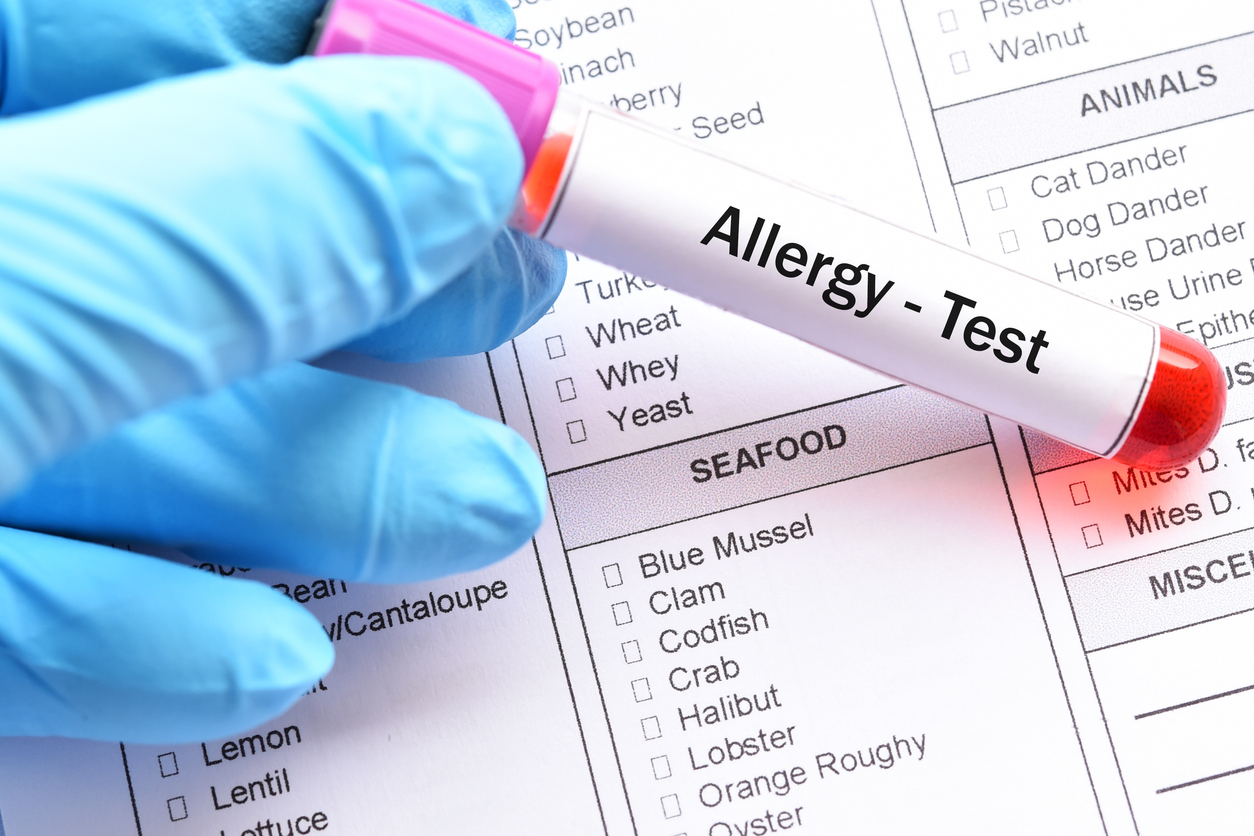What Is Blood Testing?
Blood testing is a test that measures antibodies present in your blood. This allergy test usually measures Immunoglobulin E (IgE). IgE is an antibody that your immune system develops in reaction to a specific allergen. Other relevant blood tests include radioallergosorbent testing (RAST), eosinophil counts, or immunoassay capture test (ImmunoCAP).
Allergy blood tests usually test for ten of the most common allergy triggers, including dust, pet dander, trees, grasses, weeds, and molds. It can also detect food allergies. This test is best used for those will skin conditions that cannot complete a skin prick or patch test.
Advantages of Blood Testing
Blood testing comes with many advantages over other types of allergy tests. There are no special preparations for a blood test, which makes it a more convenient option for some. There is also less risk when taking this type of test. Since the allergist is drawing blood and not injecting an allergen, you will not experience an allergic reaction. Blood tests are recommended for people who must take certain medications daily. It is also the best option for those who suffer from severe skin conditions.
Blood testing also allows for flexibility in testing for individuals who cannot stop taking antihistamines or other medications that may interfere with other allergy tests like skin prick tests. These medications do not significantly affect blood test results, enabling testing to be performed even while taking them. We recommend this test for individuals who need to stay on their medications but also want an accurate allergy diagnosis.
Disadvantages of Blood Testing
While blood testing for allergies has several advantages, it also has certain limitations and disadvantages. Unlike skin prick tests that provide immediate results, blood testing for allergies typically requires the blood sample to be sent to a lab for analysis. This means delayed results, with turnaround times ranging from a few days to a couple of weeks, depending on the lab’s workload.
Another disadvantage is that blood tests for allergies can be more expensive compared to some other diagnostic methods, such as skin prick tests. The cost can vary depending on the specific tests performed and the laboratory used. It’s important to ask about insurance and costs before your appointment.
How to Prepare For Blood Testing
The best thing about allergy blood testing is that you don’t need to do much to prepare for it. You don’t need to stop taking your important medications. Just be sure to drink plenty of water before your appointment.
You should also wear loose-fitting clothing that allows easy access to your arm, as blood is typically drawn from the inner elbow area. This will make the blood draw process more convenient and comfortable. If you have any questions or uncertainties regarding the preparation for blood testing, it is always best to consult with your allergist or the lab conducting the test.
When Is Blood Testing Necessary?
Blood testing for allergies may be necessary if you have a skin condition like eczema or psoriasis and cannot undergo traditional testing methods like skin prick testing. It’s also necessary if you are on certain medications and cannot stop taking them.
You may also need a blood test if you receive an inconclusive skin prick test. If a skin prick test produces unclear or inconclusive results, blood testing can be recommended as an alternative method to help identify specific allergens.
Blood testing may be preferred for allergy testing in infants and young children who may have difficulty cooperating or tolerating skin prick tests. It can provide valuable information about potential allergens without the need for multiple skin pricks.
Blood Testing Frequently Asked Questions
What Allergens Can Be Tested Using Blood Testing?
Allergy blood testing can detect allergen-specific IgE antibodies to environmental allergens (such as pollen, dust mites, and animal dander), foods, medications, insect venoms, and occupational allergens.
How Accurate Is Allergy Blood Testing?
Allergy blood testing is generally considered reliable and accurate, although it is important to interpret the results in conjunction with a person’s clinical history and symptoms. Please note that with any medical test, false positives and false negatives can occur.
How Long Does It Take to Receive Allergy Blood Test Results?
The time it takes to receive allergy blood test results can vary depending on the laboratory and the specific tests being performed. In general, results are typically available within a few days to a couple of weeks. Your healthcare provider can provide you with an estimate of when you can expect to receive the results.
Can Allergy Blood Testing Replace Skin Prick Testing?
Allergy blood testing and skin prick testing are complementary methods for diagnosing allergies. They provide different types of information, and the choice between the two may depend on various factors such as the suspected allergens, the individual’s age, medical history, and the preferences of the healthcare provider. In some cases, both tests may be used together to provide a more comprehensive diagnosis.
Can Allergy Blood Testing Be Performed On Infants and Young Children?
Yes, allergy blood testing can be performed on infants and young children. It can be useful in cases where skin prick or patch testing may be challenging due to the child’s age or skin conditions. However, the decision to perform blood testing in young children is made on an individual basis by an allergy specialist.

